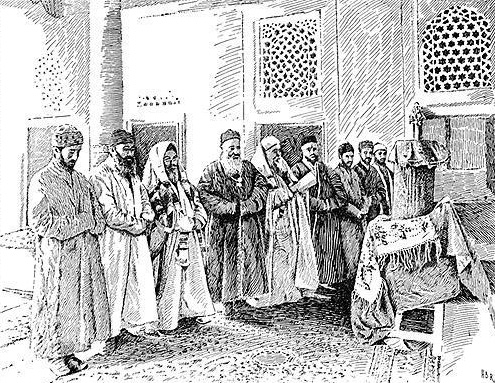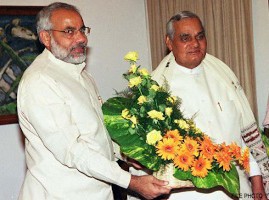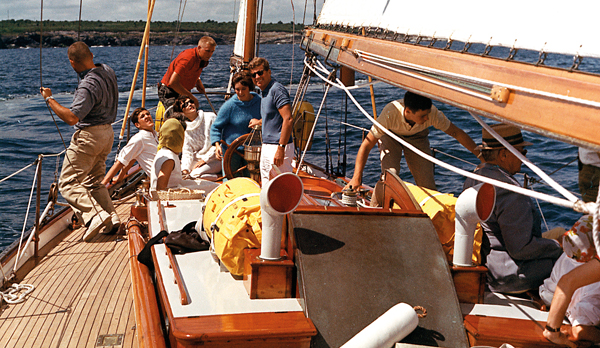|
Palace Of Nations, Dushanbe
The Palace of the Nation ( tg, Қасри Миллат, Qasri Millat; russian: Дворец Нации) is the official residence of the President of Tajikistan. It is located on Shirinshoh Shohtemur Street in central Dushanbe. The Presidential Palace is surrounded by Dushanbe Flagpole to the north, Rudaki Park to the east, Independence Monument to the south and Varzob River to the west. History The construction of the Palace began in 2000. In early 2006, the Dushanbe Synagogue and the local mikveh (ritual bath), kosher butcher, as well as Jewish schools were demolished by the government without compensation to make room for the new palace. After an international outcry, the government announced a reversal and said that would allow the synagogue to be rebuilt at its current site. However, in the final stages of the palace's construction, the government destroyed the entire synagogue, leaving Tajikistan without a synagogue as it was the only one in the country (this resulted in th ... [...More Info...] [...Related Items...] OR: [Wikipedia] [Google] [Baidu] |
Shirinsho Shotemur
Shirinsho Shotemur (also spelt ''Shirinshah Shahtimur,'' ''Shirinsho Shotemor,'' ''et al.''; '; "" ''.'' Retrieved 20 March 2017. '; 1 December 1899 – 27 October 1937) was a prominent Tajik politician who made a major contributions to the early history of and was instrumental in the establishment of the |
Bukharan Jews
Bukharan Jews (Bukharian: יהודיאני בוכארא/яҳудиёни Бухоро, ''Yahudiyoni Bukhoro''; he, יהודי בוכרה, ''Yehudey Bukhara''), in modern times also called Bukharian Jews (Bukharian: יהודיאני בוכארי/яҳудиёни бухорӣ, ''Yahudiyoni Bukhorī''; he, יהודים בוכרים, ''Yehudim Bukharim''), are an ethnoreligious Jewish sub-group of Central Asia that historically spoke Bukharian, a Judeo-Tajik dialect of the Tajik language, in turn a variety of the Persian language. Their name comes from the former Central Asian Emirate of Bukhara (now primarily Uzbekistan), which once had a sizable Jewish population. Bukharan Jews comprise Persian-speaking Jewry along with the Jews of Iran, Afghanistan, and the Caucasus Mountains. Since the dissolution of the Soviet Union, the great majority have immigrated to Israel or to the United States while others have immigrated to Europe or Australia. Bukharan Jews are Mizrahi Jews.G ... [...More Info...] [...Related Items...] OR: [Wikipedia] [Google] [Baidu] |
Buildings And Structures In Dushanbe
A building, or edifice, is an enclosed structure with a roof and walls standing more or less permanently in one place, such as a house or factory (although there's also portable buildings). Buildings come in a variety of sizes, shapes, and functions, and have been adapted throughout history for a wide number of factors, from building materials available, to weather conditions, land prices, ground conditions, specific uses, prestige, and aesthetic reasons. To better understand the term ''building'' compare the list of nonbuilding structures. Buildings serve several societal needs – primarily as shelter from weather, security, living space, privacy, to store belongings, and to comfortably live and work. A building as a shelter represents a physical division of the human habitat (a place of comfort and safety) and the ''outside'' (a place that at times may be harsh and harmful). Ever since the first cave paintings, buildings have also become objects or canvasses of much artist ... [...More Info...] [...Related Items...] OR: [Wikipedia] [Google] [Baidu] |
Tajikistani Somoni
The somoni ( tg, cомонӣ, ISO 4217 code: TJS; abbreviation:SM) is the currency of Tajikistan. It is subdivided into 100 dirams ( tg, дирам). History The somoni was introduced on 30 October 2000, replacing the rouble, at the rate of SM 1 = 1,000 Rbls. One somoni is divided into 100 dirams. Diram banknotes were first introduced on 30 October 2000, and coins were later introduced in 2001 with the intention of creating a more efficient monetary system and gradually replacing the diram notes. This was also the first time circulating coins were used in Tajikistan since independence in 1991. Coins Circulation coins, first issued in 2001, were struck in denominations of 5, 10, 20, 25, and 50 dirams composed of brass-clad steel and SM 1, SM 3, and SM 5 struck in nickel-clad steel. Bimetallic SM 3 and SM 5 coins were first released in 2003. The reverses of all somoni coins are changed annually and commemorate various events. A second iss ... [...More Info...] [...Related Items...] OR: [Wikipedia] [Google] [Baidu] |
Narendra Modi
Narendra Damodardas Modi (; born 17 September 1950) is an Indian politician serving as the List of Prime Ministers of India, 14th and current Prime Minister of India since 2014. Modi was the List of chief ministers of Gujarat, Chief Minister of Gujarat from 2001 to 2014 and is the Member of Parliament, Lok Sabha, Member of Parliament from Varanasi (Lok Sabha constituency), Varanasi. He is a member of the Bharatiya Janata Party (BJP) and of the Rashtriya Swayamsevak Sangh (RSS), a right-wing Hindutva, Hindu nationalist paramilitary volunteer organisation. He is the longest serving prime minister from outside the Indian National Congress. Modi was born and raised in Vadnagar in northeastern Gujarat, where he completed his secondary education. He was introduced to the RSS at age eight. He has reminisced about helping out after school at his father's tea stall at the Vadnagar railway station. At age 18, Modi was married to Jashodaben Modi, Jashodaben Chimanlal Modi, whom he ab ... [...More Info...] [...Related Items...] OR: [Wikipedia] [Google] [Baidu] |
John Kerry
John Forbes Kerry (born December 11, 1943) is an American attorney, politician and diplomat who currently serves as the first United States special presidential envoy for climate. A member of the Forbes family and the Democratic Party (United States), Democratic Party, he previously served as the List of secretaries of state of the United States, 68th United States Secretary of State, United States secretary of state from 2013 to 2017 under Barack Obama and as a United States Senate, United States senator from Massachusetts from 1985 to 2013. He was the Democratic nominee for president of the United States in the 2004 United States presidential election, 2004 election, losing to incumbent President George W. Bush. Kerry grew up as a child of military personnel in Massachusetts and Washington, D.C., before attending boarding school in Massachusetts and New Hampshire. In 1966, after graduating from Yale University, he enlisted in the United States Naval Reserve, ultimately atta ... [...More Info...] [...Related Items...] OR: [Wikipedia] [Google] [Baidu] |
Rudaki Avenue
Rudaki Avenue ( tg, хиёбони Рӯдакӣ, russian: проспект Рудаки) is the main thoroughfare street in Dushanbe, the capital of Tajikistan. The street is named after Rudaki, the Tajik national poet. The street was known as Lenin Avenue during the Soviet period, and used to host a statue of Vladimir Lenin Vladimir Ilyich Ulyanov. ( 1870 – 21 January 1924), better known as Vladimir Lenin,. was a Russian revolutionary, politician, and political theorist. He served as the first and founding head of government of Soviet Russia from 1917 to 1 .... The street received its current name in the summer of 1992. Key administrative buildings and cultural institutions are located on the street.Abdullaev, K. N., and Shahram Akbarzadeh. Historical Dictionary of Tajikistan'. Lanham, Md: Scarecrow Press, 2010. p. 119 References {{reflist Dushanbe Streets ... [...More Info...] [...Related Items...] OR: [Wikipedia] [Google] [Baidu] |
Tajik Soviet Socialist Republic
The Tajik Soviet Socialist Republic,, ''Çumhuriji Şūraviji Sotsialistiji Toçikiston''; russian: Таджикская Советская Социалистическая Республика, ''Tadzhikskaya Sovetskaya Sotsialisticheskaya Respublika'' also commonly known as Soviet Tajikistan and Tajik SSR, was one of the constituent republics of the Soviet Union which existed from 1929 to 1991 located in Central Asia. The Tajik Republic was created on 5 December 1929 as a national entity for the Tajik people within the Soviet Union. It succeeded the Tajik Autonomous Soviet Socialist Republic (Tajik SSR), which had been created on 14 October 1924 as a part of the predominantly Turkic Uzbek SSR in the process of national delimitation in Soviet Central Asia. On 24 August 1990, the Tajik SSR declared sovereignty in its borders. The republic was renamed the Republic of Tajikistan on 31 August 1991 and declared its independence from the disintegrating Soviet Union on 9 September 1 ... [...More Info...] [...Related Items...] OR: [Wikipedia] [Google] [Baidu] |
Alexander Lukashenko
Alexander Grigoryevich Lukashenko (as transliterated from Russian language, Russian; also transliterated from Belarusian language, Belarusian as Alyaksand(a)r Ryhoravich Lukashenka;, ; rus, Александр Григорьевич Лукашенко, Aleksandr Grigoryevich Lukashenko, ɐlʲɪkˈsandr ɡrʲɪˈɡorʲjɪvʲɪtɕ lʊkɐˈʂɛnkə. In English language, English, both transliterations are used, and his first name is often anglicized to ''Alexander''. born 30 August 1954) is a Belarusian politician who has been the first and only president of Belarus since the establishment of the office on 20 July 1994, making him the List of current state leaders by date of assumption of office, longest-sitting European president. Before his political career, Lukashenko worked as director of a state farm (''sovkhoz''), and served in the Soviet Border Troops and in the Soviet Army. Lukashenko continued state ownership of key industries in Belarus after the dissolution of the Sov ... [...More Info...] [...Related Items...] OR: [Wikipedia] [Google] [Baidu] |
Somoni
The somoni ( tg, cомонӣ, ISO 4217 code: TJS; abbreviation:SM) is the currency of Tajikistan. It is subdivided into 100 dirams ( tg, дирам). History The somoni was introduced on 30 October 2000, replacing the rouble, at the rate of SM 1 = 1,000 Rbls. One somoni is divided into 100 dirams. Diram banknotes were first introduced on 30 October 2000, and coins were later introduced in 2001 with the intention of creating a more efficient monetary system and gradually replacing the diram notes. This was also the first time circulating coins were used in Tajikistan since independence in 1991. Coins Circulation coins, first issued in 2001, were struck in denominations of 5, 10, 20, 25, and 50 dirams composed of brass-clad steel and SM 1, SM 3, and SM 5 struck in nickel-clad steel. Bimetallic SM 3 and SM 5 coins were first released in 2003. The reverses of all somoni coins are changed annually and commemorate various events. A second issue ... [...More Info...] [...Related Items...] OR: [Wikipedia] [Google] [Baidu] |
Shanghai Cooperation Organisation
russian: Шанхайская Организация Сотрудничества , image = , caption = , logo = SCO logo.svg , logo_size = 160px , map = Shanghai Cooperation Organization after 2022 Samarkand Summit.png , msize = 250px , map_caption = , abbreviation = SCO , motto = , predecessor = Shanghai Five , formation = , extinction = , type = Mutual security, political, and economic alliance , status = , purpose = , headquarters = Beijing, China (Secretariat)Tashkent, Uzbekistan (RATS Executive Committee) , location = , membership = Observers Dialogue partners Guest attendees , language = , leader_title = Secretary-General , leader_name = Zhang Ming , leader_title2 = Deputy Secretaries-General , leader_name ... [...More Info...] [...Related Items...] OR: [Wikipedia] [Google] [Baidu] |
Kosher
(also or , ) is a set of dietary laws dealing with the foods that Jewish people are permitted to eat and how those foods must be prepared according to Jewish law. Food that may be consumed is deemed kosher ( in English, yi, כּשר), from the Ashkenazic pronunciation (KUHsher) of the Hebrew (), meaning "fit" (in this context: "fit for consumption"). Although the details of the laws of are numerous and complex, they rest on a few basic principles: * Only certain types of mammals, birds and fish meeting specific criteria are kosher; the consumption of the flesh of any animals that do not meet these criteria, such as pork, frogs, and shellfish, is forbidden. * Kosher mammals and birds must be slaughtered according to a process known as ; blood may never be consumed and must be removed from meat by a process of salting and soaking in water for the meat to be permissible for use. * Meat and meat derivatives may never be mixed with milk and milk derivatives: separate eq ... [...More Info...] [...Related Items...] OR: [Wikipedia] [Google] [Baidu] |









